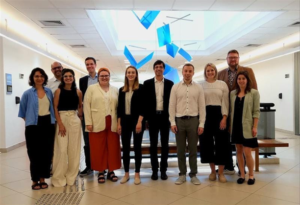
The team has arrived in Brazil in mid-February and is collecting data for the research, which takes place predominantly in collaboration with the Escola Brasileira de Administração Pública da Fundação Getulio Vargas (FGV EBAPE) and the Escola Nacional de Administração Pública (ENAP).
Their research is partly financed by the PRODIGEES project (Promoting Research on Digitalisation in Emerging Powers and Europe towards Sustainable Development). PRODIGEES, funded by the EU, promotes international collaborations and global knowledge sharing on digitalisation and sustainability in eight countries on five continents, among them Brazil and Germany. Through the exchange of ideas between different academic institutions devoted to sustainability and digitalisation, the project aims to enhance understandings of digital tools and processes and the ways they can be employed to meet the Sustainable Development Goals of the 2030 Agenda.
Digitalisation plays a crucial role in achieving the Sustainable Development Goals. To steer processes in favour of sustainable digitalisation, knowledge of digitalisation and sustainability, as well as an overview of the opportunities and risks of their interconnection, is of great importance for policy-makers and the civil sector in general. In this regard, civil servants hold a highly relevant position, being involved in both the formulation and implementation of policies and thus displaying considerable potential to steer digitalisation towards higher levels of sustainability in Brazil.
The team’s research explores the understanding of digitalisation for sustainability in the civil service of Brazil. To obtain in-depth insights into the issue, the team applies a mix of both quantitative and qualitative methods – on the one hand, by sending out a survey to civil servants in Brazil and, on the other hand, by conducting semi-structured interviews throughout different research sites in the country. The latter refer to both municipalities, such as Rio de Janeiro, Recife and Curitiba as well as to the federal level in Brasília. Through the choice of different administrative and regional levels, the team expects to develop a broad understanding of the current topics within digitalisation in Brazil and how these are linked to sustainability, especially the ecological dimension thereof.

Schreibe einen Kommentar